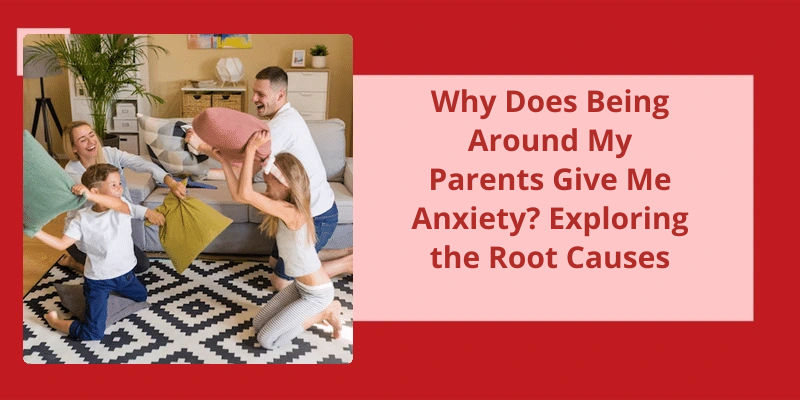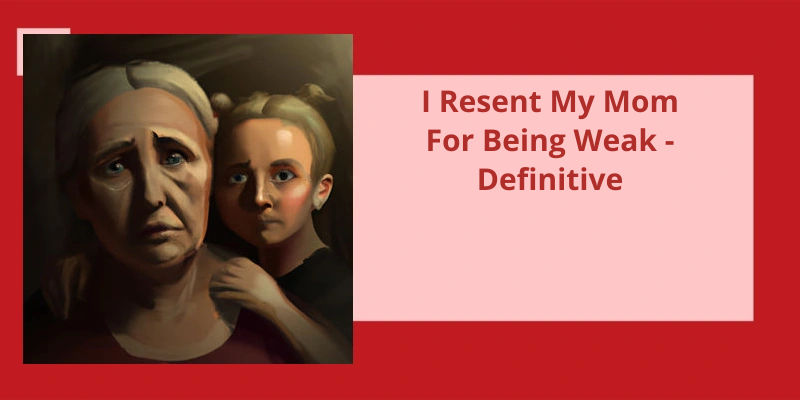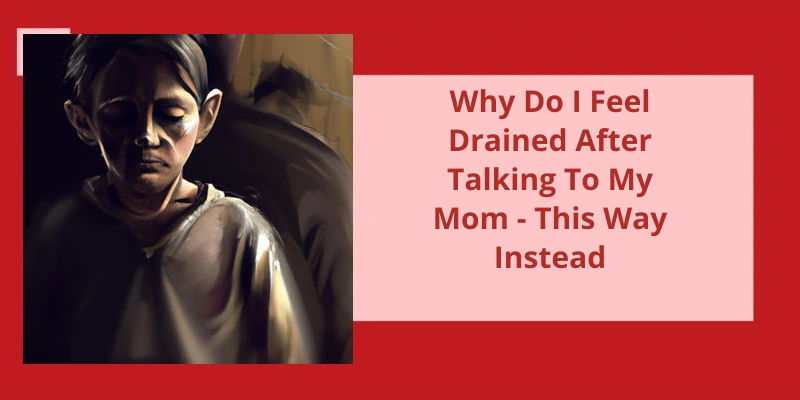As human beings, we’ve a strong innate desire to seek approval and validation from our parents, right from the moment we’re born. However, as we grow up and begin to develop our own individuality, we may find ourselves facing a unique set of challenges. One such challenge is the feeling of anxiety that arises when we’re around our parents. This anxiety can stem from a variety of sources, including academic pressure, career pressure, religious pressure, and pressure about marriage and children. Whether we’re children or adults, the fear of disappointment and the pressure to live up to our parents' expectations can leave us feeling overwhelmed and stressed, both physically and psychologically. It’s important to understand the root causes of this anxiety and learn coping mechanisms to help us navigate these complex emotions.
Can Anxiety Be Caused by Family?
These traits could make you more susceptible to developing anxiety disorders as an adult. Anxiety disorders have been linked to specific genes, so it’s definitely possible that there’s a genetic component at play.
Were critical – If your parents were overly critical or judgmental, especially during childhood, this could also contribute to the development of anxiety. If you feel that your parents were overly critical or judgmental when you were growing up, it may be worth seeking therapy to help you work through those issues.
Were overprotective – Overprotective parents can also lead to the development of anxiety. If your parents didnt allow you to take risks or didnt allow you to make mistakes when you were growing up, this can make you more anxious as an adult.
Had a history of trauma – If your parents experienced trauma in their life, this can also increase your risk of developing anxiety. Trauma can have a lasting impact on a persons mental health, and if your parents trauma was never properly addressed, it could have affected your familys mental health for generations.
Had a history of substance abuse – Substance abuse can also lead to the development of anxiety. If your parents or grandparents struggled with addiction, this can increase your risk of developing an anxiety disorder. Addiction can have a ripple effect on families, and it can be important to seek therapy to help break the cycle.
Overall, there are many factors that can contribute to the development of anxiety, and family history is certainly one of them. If youre experiencing anxiety and youre not sure why, it may be worth looking into your family history to see if there are any patterns that could explain it. By understanding where your anxiety comes from, you can start to work on strategies to manage it and live a more fulfilling life. So, it’s very important to take care of mental health and also of the family members.
As a parent, it’s normal to experience moments of worry and stress related to your child’s upbringing. However, when these feelings become overwhelming and interfere with daily life, it may be a sign of parental anxiety. This can manifest in several ways, and it’s important to address the root of these feelings to ensure healthy and happy relationships with your child.
What Is Parental Anxiety?
It can also result in the child feeling the anxiety manifest in the household. When a parent experiences anxiety, it can become a state of mind that’s difficult to break. Sleep deprivation, difficulty relaxing, or difficulty concentrating can result from parental anxiety.
Parental anxiety can take many forms. Some parents may avoid situations that they see as potentially dangerous or unpredictable. The fear of failure can be a significant factor, with daily worry about how they’re raising their children and whether they’re doing a good enough job.
It’s important to recognize the signs of parental anxiety, both for the benefit of the parent’s mental health and for the well-being of the child. Seeking help from a healthcare provider, counselor, therapist, or support group can be beneficial for parents to get guidance and support in managing their anxiety. Additionally, talking to other parents and caregivers about their experiences can help alleviate some of the anxiety.
How Does Parental Anxiety Affect the Child’s Development and Well-Being?
Research suggests that high levels of parental anxiety can negatively impact a child’s development and well-being. Children of anxious parents may be more likely to develop anxiety themselves, experience behavioral problems, and struggle with social relationships. Parental anxiety can also hinder a child’s ability to develop self-regulation skills and increase stress in the household, which can further contribute to negative outcomes.
It’s important to recognize that postnatal anxiety is a real issue that affects many new parents, not just moms. While it’s normal to feel anxious or worried about your new role as a parent, it’s also important to seek help if these feelings become overwhelming. In the following section, we’ll explore some strategies for managing postnatal anxiety and finding the support you need.
Can Being a Mom Cause Anxiety?
For many women, the experience of becoming a mother can be both incredibly rewarding and incredibly stressful. The responsibility that comes with caring for a new life can feel overwhelming at first, and it’s not uncommon for new mothers to experience anxiety as they navigate their new role. This type of anxiety, known as postnatal anxiety, can be caused by a variety of factors, including hormonal changes, lack of sleep, and the challenges of adjusting to a new routine.
Symptoms of postnatal anxiety can include feelings of worry, fear, and panic, as well as physical symptoms such as a racing heart, sweating, and dizziness. For some women, these symptoms can be severe enough to interfere with their ability to care for their new baby and themselves. If youre experiencing anxiety after giving birth, it’s important to seek help from a healthcare provider or mental health professional. They can help you identify the source of your anxiety and develop a plan for managing your symptoms.
One common aspect of postnatal anxiety is the fear that youre not doing things right as a parent. This fear can be exacerbated by the flood of information available on parenting, as well as the constant comparisons to other parents on social media. It’s important to remember that there’s no one right way to be a parent, and every child and family is different. Instead of focusing on what youre doing “wrong,” try to focus on the things youre doing well and give yourself credit for the effort youre putting in.
This fear is understandable – after all, youre responsible for the life and well-being of a tiny human – but it can become overwhelming if left unchecked. One way to manage this fear is to focus on the things you can control, such as providing a safe and nurturing environment for your baby, and trusting your instincts when it comes to their needs.
By seeking help from a professional, learning to manage your symptoms, and building a support system of family and friends, you can overcome the challenges of being a new parent and enjoy the many rewards that come with raising a child. Remember to be kind to yourself, trust your instincts, and take things one day at a time.
The Role of Medication in Treating Postnatal Anxiety
- Antidepressants
- Anxiolytics
- Benzodiazepines
- Selective serotonin reuptake inhibitors (SSRIs)
- Tricyclic antidepressants (TCAs)
- Monoamine oxidase inhibitors (MAOIs)
- Beta blockers
- Antipsychotics
- Herbal remedies
It’s not uncommon for individuals to feel anxious around their moms, and it’s often linked to the pressure and expectations that come with the relationship. If you find yourself in this situation, it’s essential to understand that you can’t change your mom’s behavior, but you can manage your response to it to ensure a healthy relationship.
Why Does Being Around My Mom Make Me Anxious?
So, what can you do to help manage your anxiety when you’re around your mom? One strategy is to set clear boundaries. This can be difficult, especially if your mom is used to being in control, but it’s an important step in managing your own emotions. You can start by identifying what behaviors or comments make you anxious, and then communicate your boundaries in a clear and assertive way. For example, if your mom tends to criticize your choices, you could say something like, “Mom, I appreciate your concern, but it’s important for me to make my own decisions.”
Another strategy is to practice mindfulness. Mindfulness is the practice of being present in the moment, without judgment. It can help you stay grounded when you’re feeling anxious around your mom. You can begin by focusing on your breath and noticing any physical sensations you’re feeling. Then, bring your attention to the present moment and any positive aspects of your surroundings.
It’s also important to prioritize self-care. Eating well, getting enough sleep, and exercising regularly can all help improve your mental health and reduce anxiety. Additionally, engaging in activities you enjoy, such as reading or spending time with friends, can help you de-stress and recharge. It’s important to remember that taking care of yourself isn’t selfish, and it can actually make you better able to support others.
A therapist can help you develop coping strategies and work through any deeper-rooted issues that may be contributing to your anxiety.
Overall, remember that you’re not alone in feeling anxious around your mom. Many people struggle with parental relationships that trigger anxiety.
How to Have Open and Honest Communication With One’s Mom About Anxiety and Ways to Improve the Relationship.
One can improve their relationship and open up about their anxiety by openly communicating and expressing their feelings. It’s important to share specific examples and to actively listen to the other person’s perspective. Setting boundaries and seeking the help of a therapist or mediator can also be helpful in improving communication.
Understanding the concept of individuation can shed light on why many young adults feel uneasy around their parents. It’s natural to desire a sense of independence as you enter adulthood, but this can create tension within family dynamics. The fear of losing control can lead to nervousness and a lack of confidence around relatives, which can be problematic. In this article, we’ll explore this topic further and offer strategies for navigating these challenging feelings.
Why Am I So Nervous Around My Parents?
As a child, we depend on our parents for everything—food, shelter, love, and attention. In this sense, our parents are our lifeline, and we feel secure with them. But as we grow older, we start to develop our own identity and sense of independence. We want to make our own decisions, pursue our own interests, and be our own person. And this is where we start to feel nervous around our parents.
It’s not that we don’t love them or appreciate what theyve done for us. It’s just that we want to assert ourselves and show that were capable of making our own decisions. We don’t want to feel like were being coddled or babied anymore. We want to prove that we can stand on our own two feet and make our way in the world.
But this process of individuation is scary. It involves taking risks, making mistakes, and sometimes failing. And when were around our parents, we feel like were being judged and evaluated. Were afraid that if we make a mistake, theyll be disappointed or critical. Were afraid that well lose their love and support if we don’t measure up to their expectations.
This fear of losing control can manifest itself in different ways. Some people become overly timid and passive around their parents, deferring to their every whim and request. Others become defensive and combative, pushing back against any attempt by their parents to control them. And still others become anxious and nervous, feeling like theyre walking on eggshells around their parents.
Whatever the case may be, it’s important to remember that individuation is a natural and healthy part of the human experience. It’s how we develop our sense of self and our ability to function as independent adults. And while it can be scary and nerve-wracking at times, it’s also incredibly liberating and rewarding. So don’t be afraid to assert yourself and take control of your life—even if it means feeling a little nervous around your parents in the process.
The Role of Cultural and Generational Differences in Nervousness Around Parents.
Individuals from different cultures and generations may experience varying degrees of nervousness when around their parents due to differences in cultural and familial expectations, communication styles, and values. These differences can impact how individuals perceive and navigate interactions with their parents, potentially resulting in increased nervousness or discomfort.
Parenting styles have been known to play a major role in the mental and emotional development of children. In particular, overcontrolling parents have been found to inadvertently contribute to higher levels of anxiety in their kids. The way parents communicate their expectations and limitations can have a significant impact on how children perceive their capabilities, ultimately affecting their levels of worry and social anxiety. Let’s take a deeper look at how parental behavior affects the mental well-being of their children.
Can Your Parents Trigger Anxiety?
It isn’t uncommon for parents to want to protect their children from harm and help them succeed in life. However, overcontrolling parents may inadvertently trigger anxiety in their children. Children who’re constantly told what to do, how to think and how to feel may begin to doubt their own abilities and fear making mistakes. This can lead to heightened levels of worry and social anxiety.
Children who’re brought up in a highly controlled environment may also develop perfectionist tendencies. They may believe that they need to be perfect to please their parents or be accepted by their peers, and therefore, worry excessively about making mistakes or failing. Perfectionism can lead to anxiety and depression as individuals set unachievable standards for themselves and blame themselves when they inevitably fall short.
It’s important for parents to find a balance between protecting their children and allowing them to take age-appropriate risks and make their own decisions. Encouraging independence and self-reliance can help children build confidence and reduce anxiety. Additionally, parents who validate their childrens feelings and provide support and guidance as needed can help their children develop healthy coping mechanisms.
The Impact of Helicopter Parenting on Anxiety
Helicopter parenting refers to excessive involvement in a child’s life by parents, which can lead to anxiety in their children. This is because children who’re constantly monitored and never allowed to make their own decisions may become overly anxious when faced with new situations or challenges. The impact of helicopter parenting on anxiety can be significant and long-lasting, with some children developing anxiety disorders that persist into adulthood.
Conclusion
In summary, it isn’t uncommon for individuals to experience anxiety around their parents. This feeling can stem from various forms of pressure, including academic, career, religious, marriage, and children. It’s crucial to recognize that this pressure can have both physical and psychological effects on a person. It’s essential to communicate with parents and set boundaries to prevent this anxiety from escalating. Parents must also understand that their children's mental health should always be a top priority, and they should avoid placing undue pressure on their children. It’s crucial to establish healthy communication and understanding between parents and children to create a harmonious and stress-free relationship.






